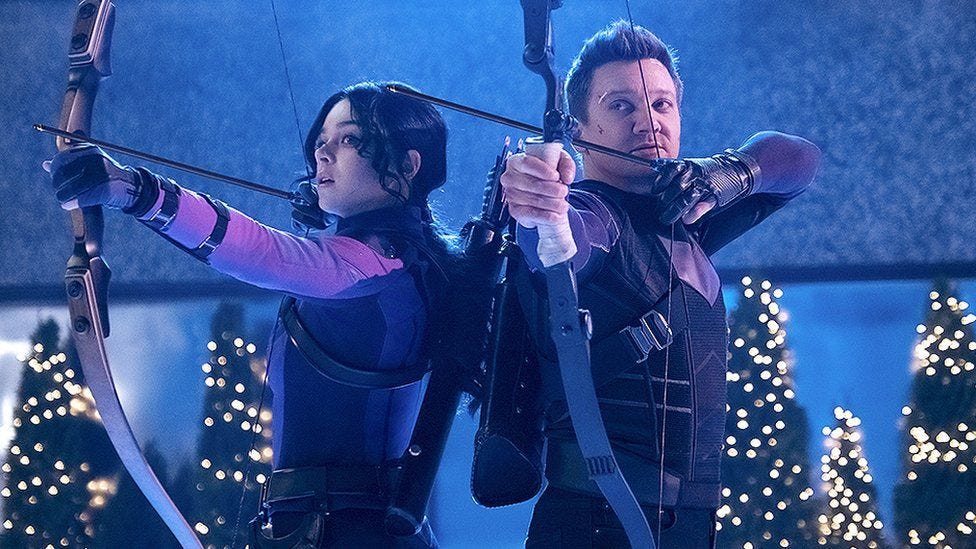What does it take to be a hero?
That’s the question at the heart of Hawkeye, the latest television series produced by Marvel Studios for the Disney Plus streaming service. There’s a double meaning inherent in the way the show poses this question as well: Hawkeye is concerned just as much with the personal sacrifices and losses heroes endure along the way as it is with the personal attributes and attitudes that make someone a hero. It’s a series very much in keeping with the best of the Marvel Cinematic Universe, telling a story driven by flawed, human characters who struggle with the meaning of their roles as heroes.
Hawkeye draws much of its emotional depth and power from its place in a narrative tapestry that stretches back nearly a decade and a half. Audiences may not have spent as much time with Jeremy Renner’s Clint Barton as we did with Robert Downey Jr.’s Tony Stark or Scarlett Johansson’s Natasha Romanoff, but we’ve nonetheless been around the block with his master archer and original Avenger. It’s this history that makes Hawkeye and its preoccupation with the nature and cost of heroism work so well, building on the experiences audiences have shared with the show’s eponymous protagonist and showing the full range of their consequences. In that respect, it makes the series a strong companion piece to previous entries in the overall mythos – especially Avengers: Endgame and Black Widow.
This background also allows the series to show events and characters we already know from different perspectives within the MCU’s mythos. That’s clear from the very first episode, when in we witness the battle of New York depicted in The Avengers through the eyes of a young and terrified Kate Bishop, who goes on to idolize Hawkeye after he unknowingly saves her with an ace arrow shot during the fighting. Hoping to emulate her own personal hero, Hailee Steinfeld’s Kate goes on to become a skilled archer and martial artist in her own right before stumbling into Clint under less-than-ideal circumstances.
Then there’s Rogers: The Musical, a Broadway show depicting the events of The Avengers that Clint and his three children attend during a holiday season visit to New York City. Written to be deliberately cheesy and, more importantly, irritate Clint, the production includes Ant-Man for reasons unclear. When his daughter Lila chides him for turning off his hearing aid, a visibly irked Clint replies, “I know what happens… Since I was there.” That the musical apparently receives rave reviews within the MCU itself gives us as viewers another perspective on how the world at large sees the Avengers.
More than anything else, though, this history imbues Hawkeye with a streak of melancholy that elevates its animating themes of sacrifice and loss. It’s perhaps most pronounced in the spectral presence of the late Avenger and Clint’s best friend Natasha Romanoff throughout the show. From the start, Natasha’s memory – and her ultimate sacrifice in Avengers: Endgame in particular – haunts Clint. He leaves his seat during Rogers: The Musical after the production reminds him of his lost friend, for instance, and appears fairly ill at ease when Kate’s mother (portrayed by Vera Farmiga) asserts that he must be familiar with personal loss in his line of work.
Clint most directly expresses his intense and abiding sense of loss when he goes to a memorial plaque erected to commemorate the events of The Avengers, one inscribed with the names of the team’s six original members. He takes out his hearing aid to talk to Natasha, noting she “was the bravest of us all” and that she always had to win – even to the point of sacrificing herself “for a stupid orange rock.” Renner delivers an impressive performance in this emotional soliloquy, dredging up powerful yet reserved emotions over Clint’s intimate friendship with Natasha and her self-sacrifice in Avengers: Endgame. As he later admits to Florence Pugh’s Yelena Belova – Natasha’s adopted sister and fellow assassin introduced in Black Widow – Natasha “made her choice. We’re going to have to find a way to live with that.”
Likewise, Natasha’s memory weighs heavily on Clint as he reluctantly takes Kate Bishop under his wing. When Kate asks him about the best shot he ever took, Clint replies that it’s “the shot I didn’t take” against Natasha. He waves off further discussion, but Kate presses him – only for Clint to forcefully shut her down by vehemently insisting, “It’s not a good story.” Later, he sees Kate dangle on a rope from the edge of a rooftop in a scene clearly meant to parallel Natasha’s final scene in Endgame, a parallel reinforced by the effective use of musical cues from that film’s score by series composers Christophe Beck and Michael Paraskevas. (The composers make similarly worthwhile use of certain cues from the Black Widow score as well.)
Kate’s also essential to perhaps the most poignant moment of the series, one that showcases the excellent chemistry between Renner and Steinfeld and speaks to the broader questions about heroism at its heart. With Clint’s hearing aid broken, Kate helps him keep up a phone conversation with his youngest son Nathaniel, writing down the son’s end of the conversation so Clint can reply. As a result, she’s privy to the fact that Clint’s son says it’s OK if he can’t be home for Christmas – a sacrifice Clint’s making to help her out of a predicament of her own making.
For Clint, heroism is something takes more than it gives and requires enormous personal sacrifice. What’s more, he’s clearly uncomfortable with his own status as a hero – like other original members of the Avengers, he’s not sure he deserves it. When we meet up with him again at the start of Hawkeye, Clint plainly harbors doubts as to whether all the sacrifice and loss we’ve seen him endure was actually worth it. Bathroom graffiti and coffee mugs asserting that “Thanos was right” certainly don’t encourage him to think otherwise. It also explains why he tries to warn Kate off the path of heroism, telling her it “comes with a lot of sacrifices… And some things you’ll lose forever.” He goes even further, claiming he’s “not a role model. I’m sorry, Kate. I’m not a role model to anyone. Never have been.”
But Kate passionately believes otherwise, and slowly but surely convinces Clint that he is indeed a hero – all while shedding her own hero worship of him. Whenever Clint tries to disavow his own hero status, Kate immediately offers a rejoinder to the contrary. As a hero, she tells him, he’s selling inspiration whether he realizes it or not. Similarly, when Clint claims he’s not a role model, she retorts, “you left your family at Christmas because you thought some stranger was going to get hurt” and “stuck around even though I screwed up.”
This repartee culminates in a heart-to-heart between the two before the series’ big finale. Wanting to make sure she’s ready for what’s ahead, Clint reminds Kate that sacrifice and loss are inherent in heroism. She replies that when she saw him “fighting aliens with a stick and a string” in The Avengers, he showed her that heroism is “for anyone who’s brave enough to do what’s right no matter the cost” – a conviction she’s brought Clint himself back around to over the course of the show. It’s put to an acid test at the end of the final episode, when Kate turns her mother over to the police (it’s complicated). Asked by her mother if arresting their parents on Christmas is what heroes do, Kate doesn’t respond directly but it’s clear she’d answer in the affirmative.
As somber and serious as Hawkeye can get, it’s not a dreary or dour series – far from it. Indeed, the show strikes an impressively effortless tonal balance between dark themes of sacrifice and loss on the one hand and light-hearted moments of fun and levity on the other. It rarely if ever strikes a discordant note, drawing its both its humor and humanity organically from its characters and the events of previous films. “Don’t mention it,” Clint replies with bemusement when thanked for saving the world; when Kate demands Yelena stop making Kate like her, Yelena disarmingly admits that she can’t help it.
The simple fact that there’s a canine companion lovingly known as Pizza Dog (eventually named Lucky after much trial and error on Kate’s part) and a contingent of good-natured live-action role players play a critical role in the narrative shows that the series can’t be tarred as a mirthless exercise. Indeed, Hawkeye manages to maintain this equipoise throughout from start to finish, smoothly sliding from one emotional register to another without ever feeling abrupt or even standing out.

The lion’s share of the credit for Hawkeye’s success must go to the actors who bring these characters to life, especially leads Jeremy Renner and Hailee Steinfeld. Without them, it’s hard to imagine Hawkeye - or the rest of the Marvel Cinematic Universe for that matter - working at all. Renner quietly brings a soulful, intense melancholy to Clint, almost single-handedly maintaining the show’s emotional equilibrium as it shifts in tone. Steinfeld likewise plays Kate with an infectious enthusiasm that’s easy to see, and she shares obvious chemistry with Renner and Florence Pugh. As elsewhere in the MCU, plot largely serves as a narrative scaffolding that allows Hawkeye’s characters to meet and interact with one another in various ways. It’s hard not to want to see them ricochet off one another all day.
Hawkeye ends with Clint Barton in a much better place, having laid down his emotional burdens and accepting that he is, indeed, a hero – all while picking up a new protégé in Kate Bishop and a new family pet in Pizza Dog. It’s an example of the MCU at its best, driven by its characters and drawing on its own mythos to explore fundamental questions surrounding heroism. What’s more, the show moves from these serious questions to wry humor with remarkable ease. We can only hope there are more adventures in store for Clint, Kate, and Lucky in the years to come.



